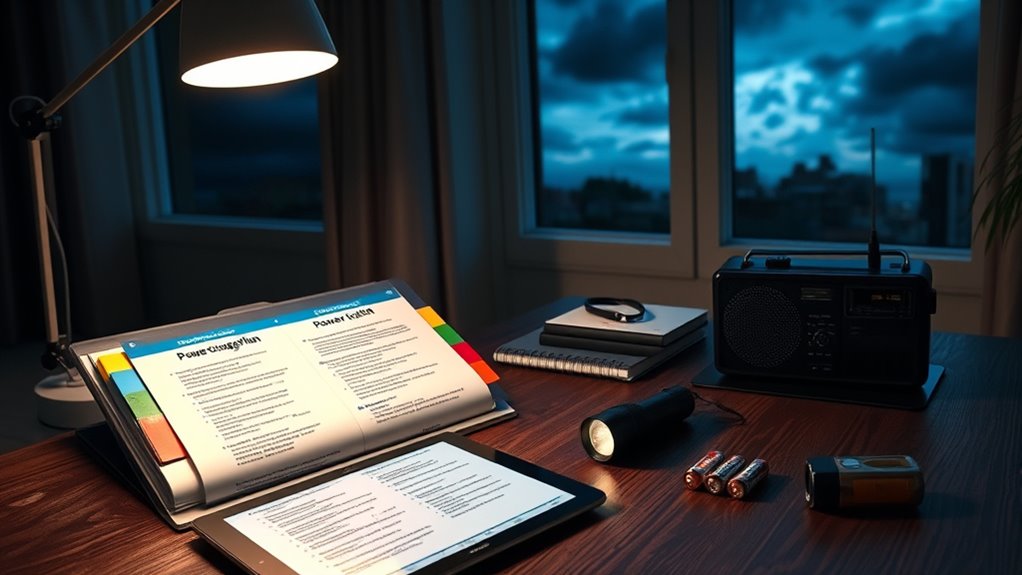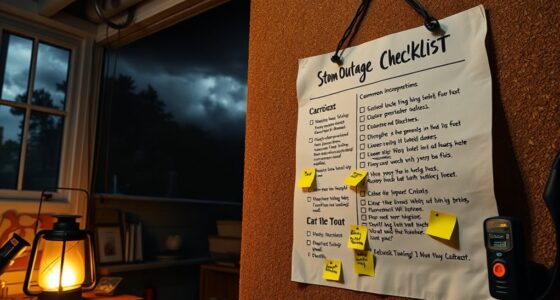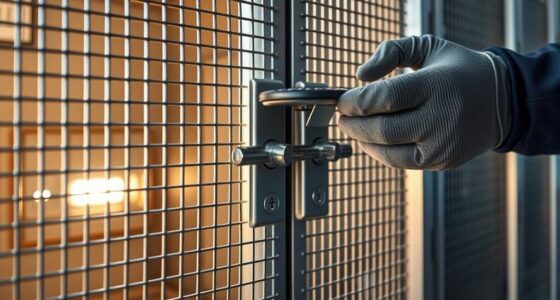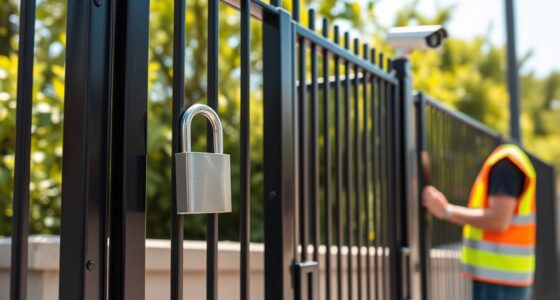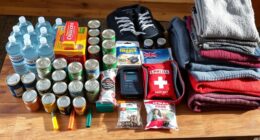To create a home power outage playbook, start by organizing your emergency kit with flashlights, batteries, water, and snacks in an accessible spot. Know how to operate your generator safely, and practice procedures regularly with all household members. Develop communication plans and keep crucial contacts handy. Incorporate safety steps, address vulnerable residents, and review your plan often. If you want to build confidence and stay prepared, continue exploring the essential tips to develop an effective outage strategy.
Key Takeaways
- Develop a comprehensive plan covering generator operation, emergency kit management, and communication strategies.
- Schedule regular generator maintenance and safety testing to ensure reliability during outages.
- Organize emergency supplies in an accessible kit, verifying expiration dates and inventory periodically.
- Practice power outage protocols with all household members, including safe generator use and communication plans.
- Review and update the playbook regularly, incorporating safety, environmental, and special needs considerations.
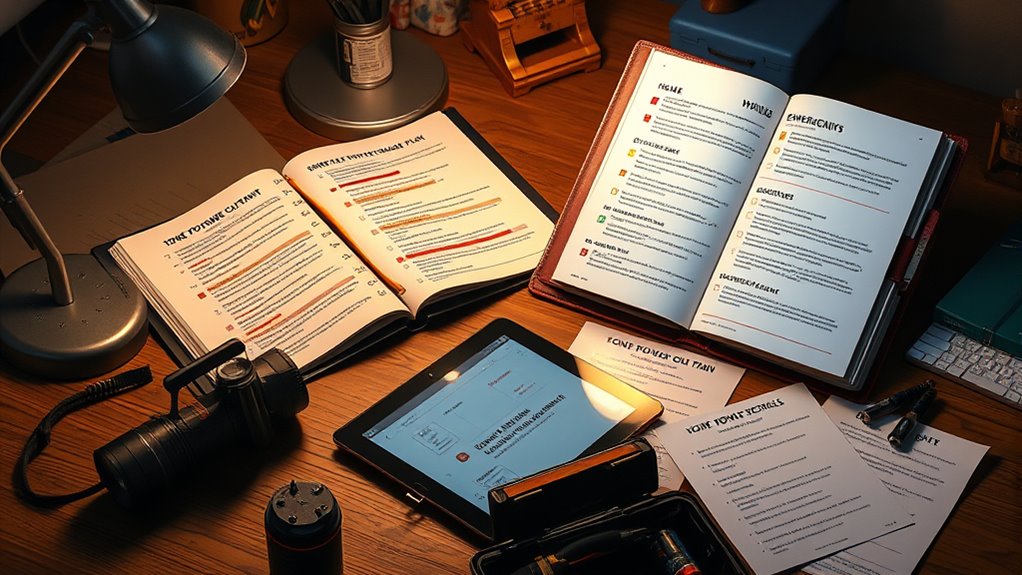
Power outages can strike unexpectedly, leaving your household in the dark and vulnerable. When the lights go out, knowing exactly what steps to take can make all the difference in keeping your family safe and comfortable. One of the most essential elements of your home power outage playbook is ensuring your generator is properly maintained. Regular generator maintenance isn’t just about keeping it running smoothly; it’s about trusting that it will start when you need it most. Schedule routine inspections, check fuel levels, and test it periodically to prevent surprises during an outage. A well-maintained generator can provide critical backup power for essential appliances, medical devices, or heating systems, giving you peace of mind during emergencies. Incorporate this maintenance into your preparedness routine so it becomes a habit, not an afterthought. Proper maintenance also ensures your generator operates efficiently and reduces emissions, contributing to a safer environment.
Equally important is organizing your emergency kit so it’s ready to go at a moment’s notice. An organized emergency kit ensures you can quickly access what you need without wasting precious time during a stressful situation. Your kit should include flashlights, batteries, a first aid kit, bottled water, non-perishable snacks, and necessary medications. Keep these supplies in a designated, easily accessible location, and periodically check expiration dates and inventory levels to ensure everything remains functional and complete. Additionally, include a portable phone charger, a battery-powered radio, and essential documents such as insurance policies and emergency contacts. When your emergency kit is thoughtfully organized, you reduce the chaos and confusion that often accompany power outages.
Creating a comprehensive power outage playbook involves integrating these key elements seamlessly. Know how to operate your generator safely, including turning it on, fueling it correctly, and shutting it down. Practice this process so it becomes second nature. Also, familiarize yourself with your emergency kit’s contents and ensure all family members know where it’s stored and how to use its items. Plan and rehearse communication strategies, like how to notify relatives or emergency services if needed. Keep a list of important contacts, outage procedures, and safety tips readily available. By establishing clear, practiced protocols, you’ll respond calmly and efficiently when the power goes out. Incorporating knowledge about air quality concerns and how to address them can further enhance your preparedness, especially if your area is prone to pollution or has vulnerable residents. The more deliberate your planning, the better equipped you’ll be to handle outages with confidence and ease.
Frequently Asked Questions
How Often Should I Review and Update My Outage Playbook?
You should review and update your outage playbook at least once a year, especially before storm seasons or extreme weather periods. During this review, check your maintenance schedule to make certain all equipment is working properly and update emergency contact information with local utilities and service providers. Regular updates help you stay prepared, identify potential issues early, and ensure your plan remains effective and reliable during a power outage.
What Are the Best Portable Power Sources for Emergencies?
In the age of dial-up internet, you’d want reliable, portable power sources. Solar generators and portable batteries top the list for emergencies. Solar generators harness sunlight and provide renewable energy, perfect for extended outages. Portable batteries are compact and quick to use for charging devices or small appliances. Both options guarantee you stay connected and safe, giving you peace of mind when power goes out.
How Can I Ensure My Data Is Protected During an Outage?
To safeguard your data during an outage, you should use data encryption to keep your information secure from unauthorized access. Additionally, regularly back up your data to the cloud so you can easily restore it once power is restored. Make sure your backups are automatic and up-to-date, and verify their integrity periodically. Combining encryption with cloud backups ensures your data remains safe and accessible, even during unexpected outages.
What Community Resources Are Available During a Power Outage?
During a power outage, you can turn to community shelters and local aid programs for support. These resources offer warmth, food, and safety, helping you stay secure and connected. Community shelters provide a safe space, while local aid offers essential supplies and assistance. Staying informed about these resources guarantees you’re prepared, connected, and supported, making tough times more manageable for you and your loved ones.
How Do I Communicate With Neighbors During an Outage?
You can communicate with neighbors during a power outage by knocking on doors or using outdoor messaging like chalkboards or signs. Make sure you have emergency contacts for neighbors, especially those who may need assistance. Share updates about the outage and coordinate gathering points or resources. Keep your phone charged if possible, and use community message boards or social media groups to stay connected and informed until power is restored.
Conclusion
Having a home power outage playbook can be a lifesaver, ensuring you’re prepared when the lights go out. Did you know that nearly 80% of homeowners experience at least one outage annually? Staying ready with a plan keeps your family safe and comfortable, no matter the situation. Take the time now to create your playbook—because being prepared means peace of mind when it matters most. Don’t wait until the next blackout hits; be ready today.
